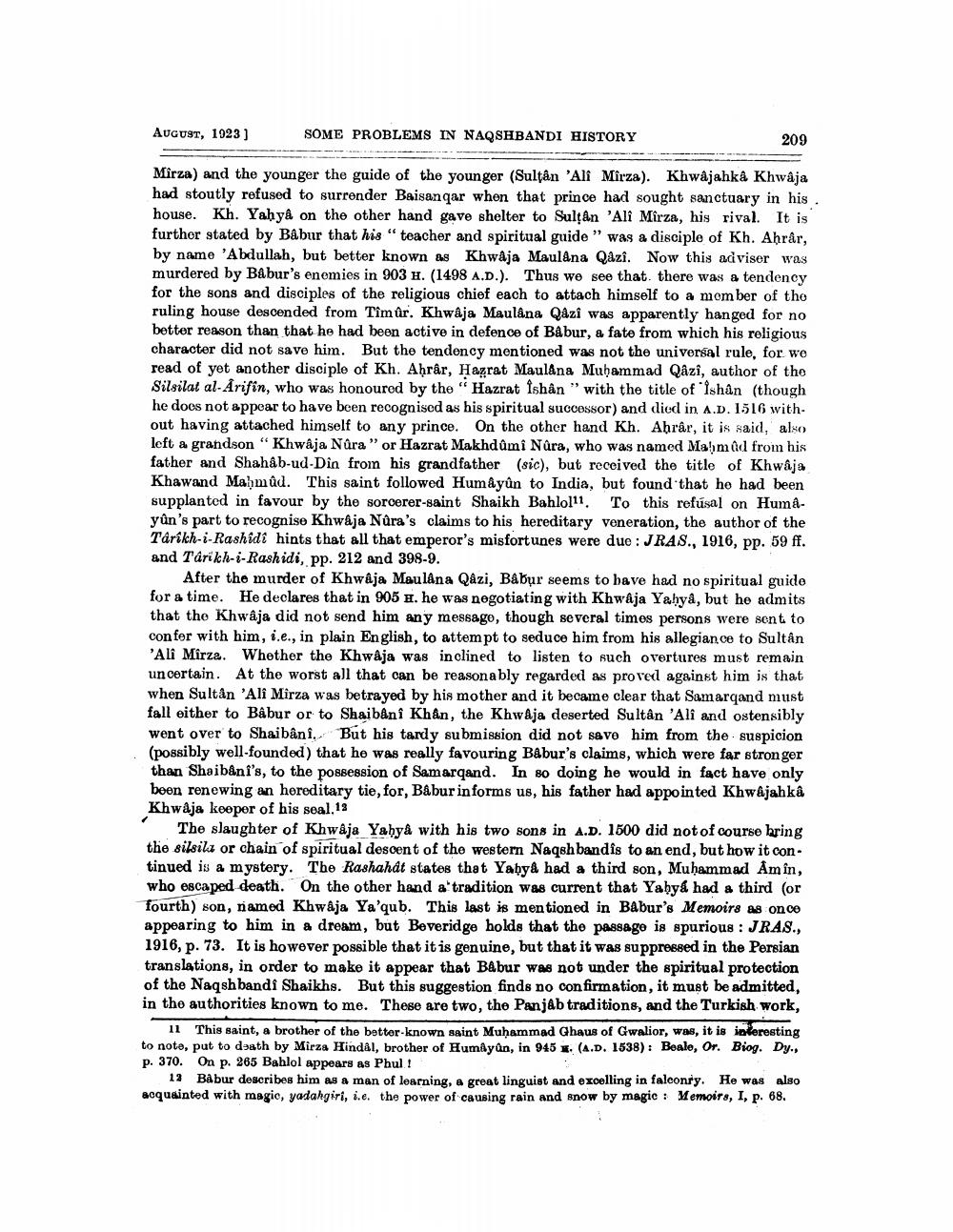________________
AUGUST, 1923]
SOME PROBLEMS IN NAQSHBANDI HISTORY
Mirza) and the younger the guide of the younger (Sulţân 'Ali Mirza). Khwajahkâ Khwaja had stoutly refused to surrender Baisanqar when that prince had sought sanctuary in his. house. Kh. Yahyâ on the other hand gave shelter to Sultan 'Ali Mirza, his rival. It is further stated by Bâbur that his "teacher and spiritual guide" was a disciple of Kh. Ahrar, by name 'Abdullah, but better known as Khwaja Maulana Qazi. Now this adviser was murdered by Bâbur's enemies in 903 H. (1498 A.D.). Thus we see that. there was a tendency for the sons and disciples of the religious chief each to attach himself to a member of the ruling house descended from Timûr. Khwaja Maulana Qâzi was apparently hanged for no better reason than that he had been active in defence of Bâbur, a fate from which his religious character did not save him. But the tendency mentioned was not the universal rule, for we read of yet another disciple of Kh. Aḥrâr, Hazrat Maulana Muḥammad Qâzî, author of the Silsilat al-Arifin, who was honoured by the "Hazrat Ishân" with the title of Ishân (though he does not appear to have been recognised as his spiritual successor) and died in A.D. 1516 without having attached himself to any prince. On the other hand Kh. Ahrâr, it is said, also left a grandson "Khwaja Nûra " or Hazrat Makhdûmî Nûra, who was named Mahmûd from his father and Shahâb-ud-Din from his grandfather (sic), but received the title of Khwaja Khawand Mahmûd. This saint followed Humâyûn to India, but found that he had been supplanted in favour by the sorcerer-saint Shaikh Bahlol11. To this refusal on Humâyûn's part to recognise Khwaja Nûra's claims to his hereditary veneration, the author of the Tarikh-i-Rashidi hints that all that emperor's misfortunes were due: JRAS., 1916, pp. 59 ff. and Tarikh-i-Rashidi, pp. 212 and 398-9.
209
After the murder of Khwaja Maulana Qâzi, Bâbur seems to have had no spiritual guide for a time. He declares that in 905 H. he was negotiating with Khwaja Yahyâ, but he admits that the Khwaja did not send him any message, though several times persons were sent to confer with him, i.e., in plain English, to attempt to seduce him from his allegiance to Sultân 'Ali Mirza. Whether the Khwaja was inclined to listen to such overtures must remain uncertain. At the worst all that can be reasonably regarded as proved against him is that when Sultan 'Ali Mirza was betrayed by his mother and it became clear that Samarqand must fall either to Bâbur or to Shaibânî Khân, the Khwaja deserted Sultân 'Ali and ostensibly went over to Shaibâni, But his tardy submission did not save him from the suspicion (possibly well-founded) that he was really favouring Babur's claims, which were far stronger than Shaibani's, to the possession of Samarqand. In so doing he would in fact have only been renewing an hereditary tie, for, Babur informs us, his father had appointed Khwajahkâ Khwaja keeper of his seal, 13
The slaughter of Khwaja Yahyâ with his two sons in A.D. 1500 did not of course bring the silsila or chain of spiritual descent of the western Naqshbandis to an end, but how it continued is a mystery. The Rashahdt states that Yahyâ had a third son, Muḥammad Amin, who escaped death. On the other hand a tradition was current that Yaby& had a third (or fourth) son, named Khwaja Ya'qub. This last is mentioned in Babur's Memoirs as once appearing to him in a dream, but Beveridge holds that the passage is spurious : JRAS., 1916, p. 73. It is however possible that it is genuine, but that it was suppressed in the Persian translations, in order to make it appear that Babur was not under the spiritual protection of the Naqshbandi Shaikhs. But this suggestion finds no confirmation, it must be admitted, in the authorities known to me. These are two, the Panjab traditions, and the Turkish work,
11 This saint, a brother of the better-known saint Muhammad Ghaus of Gwalior, was, it is interesting to note, put to death by Mirza Hindål, brother of Humayun, in 945. (A.D. 1538): Beale, Or. Biog. Dy., p. 370. On p. 265 Bahlol appears as Phul!
13 Babur describes him as a man of learning, a great linguist and excelling in falconry. He was also acquainted with magic, yadahgiri, i.e. the power of causing rain and snow by magic: Memoirs, I, p. 68.




